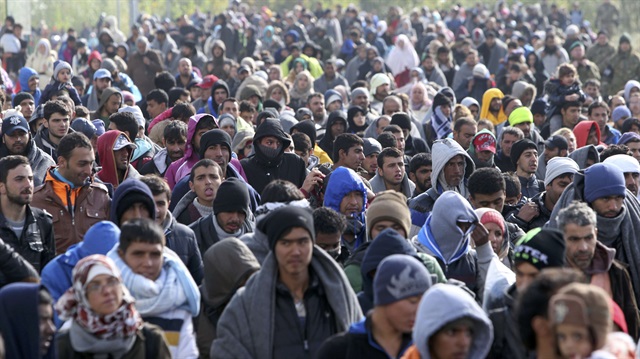The European Commission Eurobarometers show Europeans' opinions and concerns. The trust in the EU has grown.
 More than 500,000 reached Greece last year.
More than 500,000 reached Greece last year.
The European Commission has releaed two Eurobarometers on 22 December, which outline Europeans' attitudes towards the EU, as well as citizens' main concerns and perceptions of the economic situation.
The “Autumn 2016 “Standard Eurobarometer” was conducted through face-to-face interviews between 3 and 16 November 2016. A total of 32,896 people were interviewed across the EU Member States and in the candidate countries.
The Special Eurobarometer “Future of Europe” was conducted through face-to-face interviews between 24 September and 3 October 2016. A total of 27,768 people were interviewed across the EU Member States.
EUROPEAN LEVEL: IMMIGRATION AND TERRORISM
Mentioned by 45% of Europeans, immigration is seen as the most important concern in 26 Member States. Close to a third of EU citizens mention terrorism (32%, in second position).
Immigration and terrorism are mentioned as the first or second most important issue facing the EU in all Member States except Portugal, Italy, Greece, Denmark, Sweden and Finland.
The economic situation is seen as one of the most important problems facing the EU by one in five Europeans (20%, in third place).
Standard EB 86 – Immigration and terrorism still two main issues facing the EU (EU average)https://t.co/rRFVN8Qmfj pic.twitter.com/4OWo1KibLl
— EuroBarometer (@EurobarometerEU) December 22, 2016
NATIONAL LEVEL: UNEMPLOYMENT AND IMMEGRATION
Unemployment is seen as the main challenge for almost half Europeans at a national level (31%), followed by immigration (26%). Meanwhile, economic situation (19%) and health and social security (18%) come third and fourth in the list of concerns.
That is why a majority of respondents said more attention should be given to social equality and solidarity (46%), as an essential building block for the future of Europe, compared to other topics such as protecting the environment (31%) or progress and innovation (28%).
Standard EB 86 – Unemployment and immigration are the most important issues at national level (EU average)https://t.co/rRFVN8Qmfj pic.twitter.com/SiBagfz3Ga
— EuroBarometer (@EurobarometerEU) December 22, 2016
POSITIVE VIEWS ABOUT THE EU
Continuing the positive trend seen in the spring 2016 survey, trust in the EU has increased to 36% (up from 33%). Moreover, a large group (66%) agree the EU is a place of stability in a troubled world.
Trust in national parliaments and governments has also increased but remains below trust in the EU.
Given the growing opposition in some member states to deepening the EU, countries like France advocated a two-speed Europe so the most pro-EU capitals could move forward in the process.
However, Europeans remain divided over this solution. While 47% of respondents said that countries in favour of intensifying common European policies in key areas should do so without having to wait for the others, 41% disagree with this option.
Additionally, 67% of Europeans feel they are citizens of the EU, and Four in ten Europeans consider that their voice counts in Europe.
AGAINST EU ECONOMIC GOVERNMENT
But Europeans are less enthusiastic when it comes to giving a bigger role to EU institutions in managing the economy. In fact, they oppose creating an EU economic government, according to an EU-wide opinion poll. Only one in five said having an economic government for the EU would be helpful for the future of Europe.
Although 68% of Europeans favoured more decision-making at European level to stimulate investment and job creation, the European approach was more welcome in other areas such as fighting terrorism (80%), promoting democracy and peace (80%), or protecting the environment (77%).
The Nordic countries and Austria are the less supportive countries of a European approach in investment and job creation.
PESSIMISTIC FUTURE
The other Eurobarometer survey, indicated that Europeans are more pessimistic about their national economies than their personal situation.
While 56% of respondents judged the economic situation in other countries negatively, 69% believe the financial situation at home is totally good.
At the same time, 45% of respondents considered that the impact of the economic crisis on the job market will deteriorate further, while 42% responded that a turning point has already been reached.
Views about the future are rather pessimistic. More than half of Europeans (56%) think life for today’s children will be more difficult than for their own generation.

Las opiniones vertidas por nuestros colaboradores se realizan a nivel personal, pudiendo coincidir o no con la postura de la dirección de Protestante Digital.
Si quieres comentar o